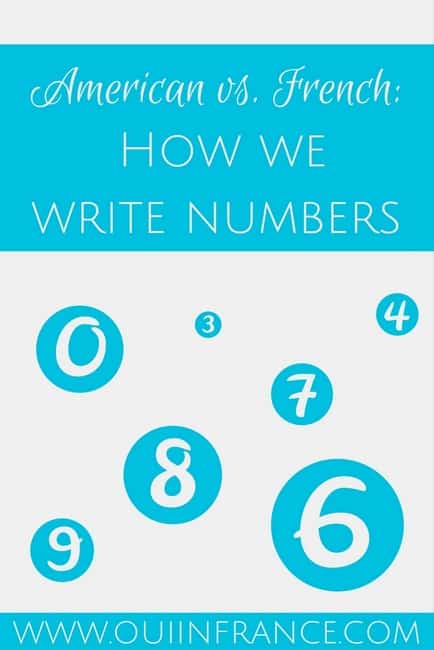8 Little things this American does to fit in with the French
For me, adapting to a new culture goes well beyond just wanting to fit in. Sure, it feels nice to belong, but it’s also about understanding French culture, making life easier on myself, showing others that I respect how things are done here, and learning to be flexible.
Parts of adapting are easier than others, so for today’s post, let’s keep it light with some little things I’ve learned to do to fit in with the French:

1. I write numbers the “French way”
As a kid learning how to write back in my NJ kindergarten class, a 7 didn’t have a bar in it and a 9 didn’t look like a lowercase g. But in France, numbers are written a bit differently (penmanship in general is a bit different).
I broke myself of my American number writing habits right away because my goal is to be clear and understood. By not putting a bar through my 7, people sometimes thought my 7s were 1s. I wrote a post on how the French write numbers if you want to know more. And here’s a tutorial on French phone numbers.
2. I learned Celsius
Everything in France is in Celsius so if you’re only familiar with Fahrenheit, definitely learn Celsius ASAP. From the weather, to your heat/air conditioning temps, to knowing whether or not you have a fever, to laundry cycle settings, and so much more, you’ll need to know Celsius for everyday life.
Don’t worry, it’s easy! Just know that 0 is freezing, 23 is a lovely spring day, and anything above 30 is HOT.
3. I pronounce English words and cities like the French do so I’m understood
As I mentioned above in my first point, it’s important to be understood. That means pronouncing English words and places with a French accent, the way the French would.
If I am telling someone in French that my family lives north of Miami, I pronounce the city mee-am-ee and not my-AM-ee. Le sweat, parking, shampooing, etc. all get pronounced like the French when I’m speaking French. My goal is always to communicate clearly and not to flex in the pronunciation department (which will just confuse people because the American pronunciation won’t always be understood).
Likewise, I pronounce croissant the American way, cruh-sont, when speaking English (same with hors d’oeuvres, cul de sac, etc.). It’s actually funny to me when people call me out for saying croissant the American way when I’m speaking English (or assume I don’t know how to say it the French way).
The same goes for when I order Sauvignon Blanc in an American restaurant. I’m not going to whip out my French pronunciation. It’s weird to accent switch and people think you’re trying to be fancy. I keep my languages separate. 😉
I find this topic fascinating and wrote a blog post on it that you might like — how do you pronounce foreign words when speaking your mother tongue? Or vice versa, how do you pronounce words from your mother tongue when speaking a foreign language?
Do I feel French? >>
4. I don’t go grocery shopping on Saturday afternoon
You’ll learn very quickly that the worst time to grocery shop is after lunch on Saturday afternoons. Stores are packed, cashiers always seem to be in short supply, and the lines are enough to make even a patient person lose their cool.
Avoid this at all costs. The best time to go is right when the store opens or at lunch time (if the store is open, that is). But NOT after!
Here are my best tips for grocery shopping in France like a pro.
5. I buy in-season produce
In France, the supermarket produce section will not be overflowing with every fruit and vegetable imaginable. Ex. It’s difficult to find strawberries outside of the April-June timeframe.
The French celebrate the seasons a bit more than we do in the U.S. by offering fresh, local produce at its peak. This goes for restaurant menus as well, where you’ll find local dishes featuring in-season produce.
If it’s not in season, you won’t find it. In the spring, it’s all about strawberries, cherries, and asparagus. Summer brings juicy melons and nectarines. Embrace it and cook with the seasons!
6. Leisurely Sundays
Most shops are closed on Sundays (or are open in the morning only), making it the perfect day to explore your neighborhood on foot. Take a leisurely stroll through a park, visit a museum, or simply relax with family and friends. Sundays are for rest. Trust me, the slower pace does a body good!
7. La bise
I have a love/hate relationship with French cheek kisses…. well, mostly hate. They can throw unsuspecting Americans for a loop and I personally find them a bit awkward. But I do them.
Forget a friendly hug — you faire la bise in France. Do one on each side when you get to a party, see family members, meet up with friends, etc. And often when you leave too.
The number of kisses can vary depending on the region, so be prepared for a little left-right dance. My advice? Play it cool, follow the French person’s lead, and maybe practice in the mirror beforehand. Also, if you’re sick, you can politely decline.
Forget “hey” or “what’s up,” or worse, just launching into your question or request without any greeting at all. In France, social politeness is taken seriously and there’s a level of formality to it with people you don’t know. People learn this right away when they move to France. The importance of saying bonjour is something I stress over and over on my blog.
Always greet shopkeepers, servers, or anyone you encounter with a “bonjour” at the very least and tack on a “monsieur/madame” for good measure. It shows you’re familiar with French norms and is a sign of respect that goes a long way. Avoid being rude at all costs!
***
What little French habits have you incorporated into your life? Talk to me in the comments!







Bonjour Diane. Another excellent posting. I don’t know how you manage the consistently post so many informative articles and always with a pleasant tone.
Great suggestions on writing numbers and when to grocery shop. I have found early mornings to also be a good time and to avoid going at the 5:00 hour.
I hope you are doing well. Joe DiPrimio.
Very interesting post Diane as usual. However I didn’t know there was an American way to pronounce Sauvignon blanc. I’m intrigued!
Glad you enjoyed it!! The American way is so-vin-yon-blonk
As a French-born woman, I have adapted to many things in my 48 years in the States. But I cannot bring myself to mispronounce wine, especially saying “blank” for blanc.
Also, it took me years to learn how to pronounce cities and other words that are (were) French, such as Boise, Baton Rouge or Nez Perce. Although saying “purse” for Percé makes me shudder a little.
Bonjour Diane!
I lived in Germany for eight years twenty years ago and learned how to write my 7’s with the bar.
I’m guessing it’s kind of a European thing? Their 4’s and 9’s always confused me. Were they just sloppy or lazy?
I always had to ask for clarification.
Hope you’re enjoying your day!
M-C
Bonjour!! I STILL have to ask my husband about his fours. Just to make sure hahaha
I’ve crossed my sevens since I took math in high school.and university.in the US. Several of the other French letters are challenging though.
I hear “sah ving yon blonk” from Americans too.
Sometimes I start a hug then remember it should be a bise.I try to switch and look as if I’m attacking the person.
This was enjoyable to read as it gives a nice bit of insight into everyday French life. It’s amazing how adaptive we are, I will have to think about what I do to fit in as a Brit living in the U.S.. Thanks for sharing this look into what it’s like.
You’re very welcome, Molly. 🙂 Thx for reading, as always!
We have recently moved to France. I have been trying hard to make the « Bonjour » a habit. It comes hard to me when walking into a store and everyone’s back is to me. I prefer to say it when it’s my turn, but my husband says it when we walk in the door. I have been impressed by the fact that all ages will greet you with a bonjour when walking by, even small children & teenagers. It is so ingrained in the culture – it’s really a lovely habit.
We quickly learned to shop during the lunch hour, however, I think that is just because we don’t like crowds !
I learned to cross my sevens many years ago which confused some Americans, but I also try to cross my zeros too. Especially helpful when doing passwords !
We haven’t been able to adapt to the eating schedule yet, cooking a large meal midday is a pain. Unless we’re going out, then we keep dinner small.
Thanks for your blog. It’s nice to see what you have experienced and much of it reflects what we’re experiencing now.